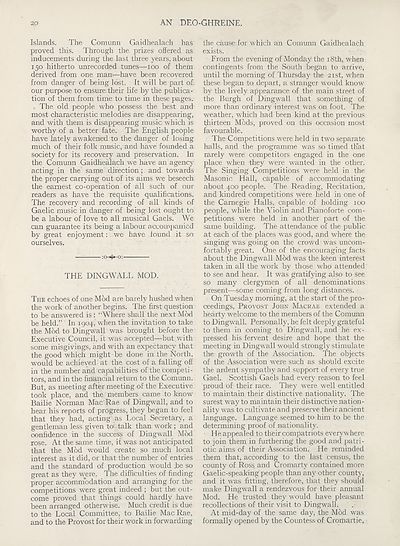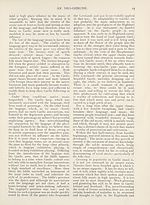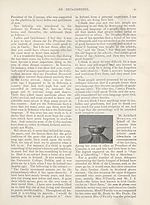An Comunn Gàidhealach Publications > Deo-gréine > Volume 1, October 1905-September 1906
(32) Page 20
Download files
Complete book:
Individual page:
Thumbnail gallery: Grid view | List view

2.0
AN DEO-GHREINE.
Islands. The Comunn Gaidhealach has
proved this. Through the prizes offered as
inducements during the last three years, about
150 hitherto unrecorded tunes—100 of them
derived from one man—have been recovered
from danger of being lost. It will be part off
our purpose to ensure their life by the publica¬
tion of them from time to time in these pages.
. The old people who possess the best and
most characteristic melodies are disappearing,
and with them is disappearing music which is
worthy of a better fate. The English people
have lately awakened to the danger of losing
much of their folk music, and have founded a
society for its recovery and preservation. In
the Comunn Gaidhealach we have an agency
acting in the same direction ; and towards
the proper carrying out of its aims we beseech
the earnest co-operation of all such of our
readers as have the requisite qualifications.
The recovery and recording of all kinds of
Gaelic music in danger of being lost ought to
be a labour of love to all musical Gaels. We
can guarantee its being a labour accompanied
by great enjoyment: we have found it so
ourselves.
THE DINGWALL MOD.
The echoes of one M6d are barely hushed when
the work of another begins. The first question
to be answered is : “Where shall the next Mod
be held.” In 1904,' when the invitation to take
the Mod to Dingwall was brought before the
Executive Council, it was accepted—but with
some misgivings, and with an expectancy that
the good which might be done in the North,
would be achieved at the cost of a falling off
in the number and capabilities of the competi¬
tors, and in the financial return to the Comunn.
But, as meeting after meeting of the Executive
took place, and the members came to know
Bailie Norman Mac Rae of Dingwall, and to
hear his reports of progress, they began to feel
that they had, acting as Local Secretary, a
gentleman less given to talk than work ; and
confidence in the success of Dingwall Mod
rose. At the same time, if was not anticipated
that the Mod would create so much local
interest as it did, or that the number of entries
and the standard of production would .be so
great as they were. The difficulties of finding
proper accommodation and arranging for the
competitions were great indeed ; but the out¬
come proved that things could hardly have
been arranged otherwise. Much credit is due
to the Local Committee, to Bailie Mac Rae,
and to the Provost for their work in forwarding
the cause for which a!n Comunn Gaidhealach
exists.
From the evening of Monday the 18th, when
contingents from the South began to arrive,
until the morning of Thursday the 21st, when
these began to depart, a stranger would know
by the lively appearance of the main street of
the Burgh of Dingwall that something of
more than ordinary interest was on foot. The
weather, which had been kind at the previous
thirteen Mods, proved on this occasion most
favourable.
The.Competitions were held in two separate
halls, and the programme was so timed that
rarely were competitors engaged in the one
place when they were wanted in the other.
The Singing Competitions were held in the
Masonic Hall, capable of accommodating
about 400 people. The Reading, Recitation,
and kindred competitions were held in one of
the Carnegie Halls, capable of holding 100
people, while the Violin and Pianoforte com¬
petitions were held in another part of the
same building. The attendance of the public
at each of the places was good, and where the
singing was going on the crowd was uncom¬
fortably great. One of the encouraging facts
about the Dingwall Mod was the keen interest
taken in all the work by those who attended
to see and hear. It was gratifying also to see
so many clergymen of all denominations
present—some coming from long distances.
On Tuesday morning, at the start of the pro¬
ceedings, Provost John Macrae extended a
hearty welcome to the members of the Comunn
to Dingwall. Personally, he felt deeply grateful
to them in coming to Dingwall, and he ex¬
pressed his fervent desire and hope that the
meeting in Dingwall would strongly stimulate
the growth of the Association. The objects
of the Association were such as should excite
the ardent sympathy and support of every true
Gael. Scottish Gaels had every reason to feel
proud of their race. They were well entitled
to maintain their distinctive nationality. The
surest way to maintain their distinctive nation¬
ality was to cultivate and preserve their ancient
language. Language seemed to him to be the
determining proof of nationality.
He appealed to their compatriots everywhere
to join them in furthering the good and patri¬
otic aims of their Association. He reminded
them that, according to the last census, the
county of Ross and Cromarty contained more
Gaelic-speaking people than any other county,
and it was fitting, therefore, that they should
make Dingwall a rendezvous for their annual
Mod. He trusted they would have pleasant
recollections of their visit to Dingwall.
At mid-day of the same day, the Mod was
formally opened by the Countess of Cromartie,
AN DEO-GHREINE.
Islands. The Comunn Gaidhealach has
proved this. Through the prizes offered as
inducements during the last three years, about
150 hitherto unrecorded tunes—100 of them
derived from one man—have been recovered
from danger of being lost. It will be part off
our purpose to ensure their life by the publica¬
tion of them from time to time in these pages.
. The old people who possess the best and
most characteristic melodies are disappearing,
and with them is disappearing music which is
worthy of a better fate. The English people
have lately awakened to the danger of losing
much of their folk music, and have founded a
society for its recovery and preservation. In
the Comunn Gaidhealach we have an agency
acting in the same direction ; and towards
the proper carrying out of its aims we beseech
the earnest co-operation of all such of our
readers as have the requisite qualifications.
The recovery and recording of all kinds of
Gaelic music in danger of being lost ought to
be a labour of love to all musical Gaels. We
can guarantee its being a labour accompanied
by great enjoyment: we have found it so
ourselves.
THE DINGWALL MOD.
The echoes of one M6d are barely hushed when
the work of another begins. The first question
to be answered is : “Where shall the next Mod
be held.” In 1904,' when the invitation to take
the Mod to Dingwall was brought before the
Executive Council, it was accepted—but with
some misgivings, and with an expectancy that
the good which might be done in the North,
would be achieved at the cost of a falling off
in the number and capabilities of the competi¬
tors, and in the financial return to the Comunn.
But, as meeting after meeting of the Executive
took place, and the members came to know
Bailie Norman Mac Rae of Dingwall, and to
hear his reports of progress, they began to feel
that they had, acting as Local Secretary, a
gentleman less given to talk than work ; and
confidence in the success of Dingwall Mod
rose. At the same time, if was not anticipated
that the Mod would create so much local
interest as it did, or that the number of entries
and the standard of production would .be so
great as they were. The difficulties of finding
proper accommodation and arranging for the
competitions were great indeed ; but the out¬
come proved that things could hardly have
been arranged otherwise. Much credit is due
to the Local Committee, to Bailie Mac Rae,
and to the Provost for their work in forwarding
the cause for which a!n Comunn Gaidhealach
exists.
From the evening of Monday the 18th, when
contingents from the South began to arrive,
until the morning of Thursday the 21st, when
these began to depart, a stranger would know
by the lively appearance of the main street of
the Burgh of Dingwall that something of
more than ordinary interest was on foot. The
weather, which had been kind at the previous
thirteen Mods, proved on this occasion most
favourable.
The.Competitions were held in two separate
halls, and the programme was so timed that
rarely were competitors engaged in the one
place when they were wanted in the other.
The Singing Competitions were held in the
Masonic Hall, capable of accommodating
about 400 people. The Reading, Recitation,
and kindred competitions were held in one of
the Carnegie Halls, capable of holding 100
people, while the Violin and Pianoforte com¬
petitions were held in another part of the
same building. The attendance of the public
at each of the places was good, and where the
singing was going on the crowd was uncom¬
fortably great. One of the encouraging facts
about the Dingwall Mod was the keen interest
taken in all the work by those who attended
to see and hear. It was gratifying also to see
so many clergymen of all denominations
present—some coming from long distances.
On Tuesday morning, at the start of the pro¬
ceedings, Provost John Macrae extended a
hearty welcome to the members of the Comunn
to Dingwall. Personally, he felt deeply grateful
to them in coming to Dingwall, and he ex¬
pressed his fervent desire and hope that the
meeting in Dingwall would strongly stimulate
the growth of the Association. The objects
of the Association were such as should excite
the ardent sympathy and support of every true
Gael. Scottish Gaels had every reason to feel
proud of their race. They were well entitled
to maintain their distinctive nationality. The
surest way to maintain their distinctive nation¬
ality was to cultivate and preserve their ancient
language. Language seemed to him to be the
determining proof of nationality.
He appealed to their compatriots everywhere
to join them in furthering the good and patri¬
otic aims of their Association. He reminded
them that, according to the last census, the
county of Ross and Cromarty contained more
Gaelic-speaking people than any other county,
and it was fitting, therefore, that they should
make Dingwall a rendezvous for their annual
Mod. He trusted they would have pleasant
recollections of their visit to Dingwall.
At mid-day of the same day, the Mod was
formally opened by the Countess of Cromartie,
Set display mode to:
![]() Universal Viewer |
Universal Viewer | ![]() Mirador |
Large image | Transcription
Mirador |
Large image | Transcription
| An Comunn Gàidhealach > An Comunn Gàidhealach Publications > Deo-gréine > Volume 1, October 1905-September 1906 > (32) Page 20 |
|---|
| Permanent URL | https://digital.nls.uk/125242296 |
|---|
| Description | Leabhar 1, An deicheamh mios 1, 1905 gu Mios Meadhonach an Fhoghair 1906. |
|---|---|
| Attribution and copyright: |
|
| Description | This contains items published by An Comunn, which are not specifically Mòd-related. It includes journals, annual reports and corporate documents, policy statements, educational resources and published plays and literature. It is arranged alphabetically by title. |
|---|
| Description | A collection of over 400 items published by An Comunn Gàidhealach, the organisation which promotes Gaelic language and culture and organises the Royal National Mòd. Dating from 1891 up to the present day, the collection includes journals and newspapers, annual reports, educational materials, national Mòd programmes, published Mòd literature and music. |
|---|---|
| Additional NLS resources: |
|

